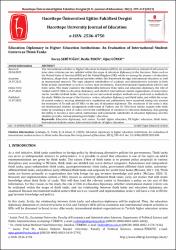| dc.contributor.author | Şehitoğlu, Recep | |
| dc.contributor.author | Tekin, Bedia | |
| dc.contributor.author | Güner, Oğuz | |
| dc.date.accessioned | 2023-08-18T08:37:27Z | |
| dc.date.available | 2023-08-18T08:37:27Z | |
| dc.date.issued | 2023 | en_US |
| dc.identifier.citation | ŞEHİTOĞLU, Recep, Bedia TEKİN & Oğuz GÜNAR. "Education diplomacy in higher education institutions: An evaluation of international student centers as think tanks". Hacettepe University Journal of Education, 38.3 (2023): 399-410. | en_US |
| dc.identifier.uri | efdergi.hacettepe.edu.tr/yonetim/plugins/uploads/files/4266-published.pdf | |
| dc.identifier.uri | https://hdl.handle.net/11352/4641 | |
| dc.description.abstract | The international activities of Higher Education Institutions (HEIs) are considered an element of soft power in inter-state relations and are included within the scope of education diplomacy in the literature. States such as the United States of America (USA) and the United Kingdom (UK), which are among the pioneers of education diplomacy, shape their international activities within this framework through international education as well as international research. The main adaptive stakeholders of academic and administrative activities in both fields include universities as well as various state institutions, Non-Governmental Organizations (NGOs) and think tanks. This study examines the relationship between think tanks and education diplomacy, the role of Turkish and US HEIs in education diplomacy, and whether international student organizations of universities can be considered think tanks. Literature review and content analysis methods were preferred as methods in the study. Within the scope of the literature review, education diplomacy and think tanks, and within the scope of content analysis, existing administrative regulations and publications were examined, taking into account the structures of Turkish and US HEIs on the axis of education diplomacy. The conclusion of the study is that the international student management preferences of Turkish and US HEIs have similar outputs with think tanks by assuming a kind of central role in the contribution of countries to education diplomacy, thus gaining the ability to become a more active, institutional and sustainable stakeholder in education diplomacy and this situation provides various advantages to higher education. | en_US |
| dc.language.iso | eng | en_US |
| dc.publisher | Hacettepe Üniversitesi | en_US |
| dc.relation.isversionof | 10.16986/HUJE.2023.496 | en_US |
| dc.rights | info:eu-repo/semantics/openAccess | en_US |
| dc.subject | Education diplomacy | en_US |
| dc.subject | Soft power | en_US |
| dc.subject | Turkish higher education | en_US |
| dc.subject | US higher education | en_US |
| dc.subject | Think tanks | en_US |
| dc.subject | International student centers | en_US |
| dc.subject | International students in higher education | en_US |
| dc.title | Education Diplomacy in Higher Education Institutions: An Evaluation of International Student Centers as Think Tanks | en_US |
| dc.type | article | en_US |
| dc.relation.journal | Hacettepe University Journal of Education | en_US |
| dc.contributor.department | FSM Vakıf Üniversitesi | en_US |
| dc.contributor.authorID | https://orcid.org/0000-0001-6855-4841 | en_US |
| dc.contributor.authorID | https://orcid.org/0000-0002-3170-7426 | en_US |
| dc.contributor.authorID | https://orcid.org/0000-0003-1619-579X | en_US |
| dc.identifier.volume | 38 | en_US |
| dc.identifier.issue | 3 | en_US |
| dc.identifier.startpage | 399 | en_US |
| dc.identifier.endpage | 410 | en_US |
| dc.relation.publicationcategory | Makale - Uluslararası Hakemli Dergi - İdari Personel ve Öğrenci | en_US |
| dc.contributor.institutionauthor | Tekin, Bedia | |



















